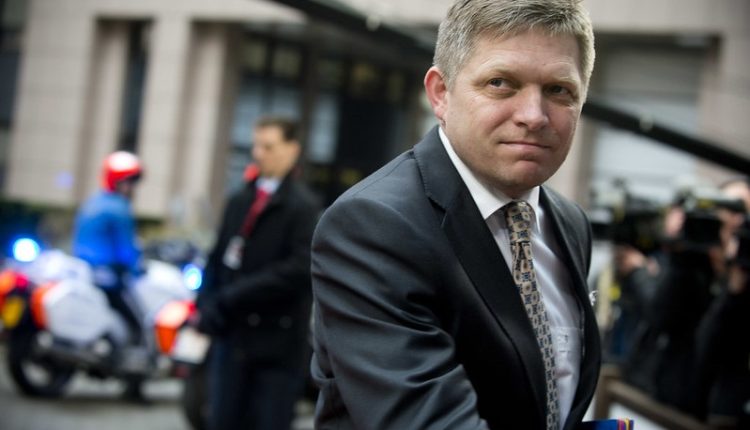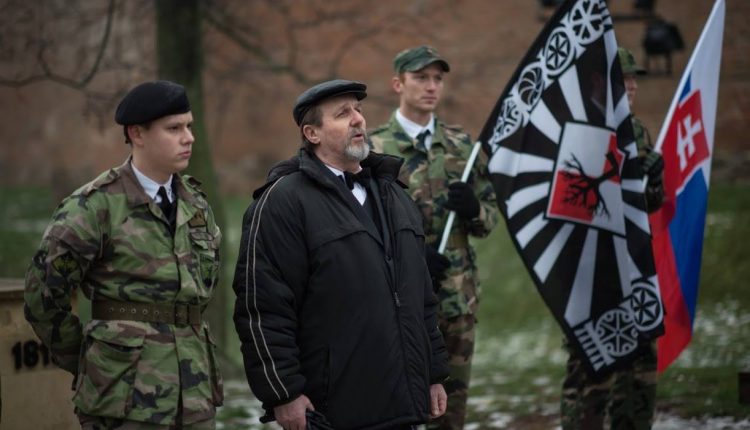How Russia links Ukraine and the West with Fico’s assassination
Pro-Kremlin disinformation narratives blaming Ukraine and the West for the attempted assassination of Slovak Prime-minister, Robert Fico, recall the same accusations related to the terrorist attack of City Hall Crocus in Moscow, which Truthmeter already covered. These unsubstantiated disinformation stories are part of a wider campaign of Russian official representatives and media, including Putin himself, to blame Ukraine, NATO, and other actors for both attacks, stresses EUvsDisinfo
Pro-Kremlin disinformation narratives blaming Ukraine and the West for the attempted assassination of Slovak Prime-minister, Robert Fico, recall the same accusations related to the terrorist attack of City Hall Crocus in Moscow, which Truthmeter already covered. These unsubstantiated disinformation stories are part of a wider campaign of Russian official representatives and media, including Putin himself, to blame Ukraine, NATO, and other actors for both attacks, stresses EUvsDisinfo
Author: Ana Anastasovska
On the 15th of May 2024 in the Slovak town of Handlova, Prime Minister of Slovakia Robert Fico was shot in front of the building where his meeting took place. He has been in critical health condition for days now. The attacker was arrested on the spot, while the incident became the subject of intensive media coverage and social network discussions. Soon Fico’s assault was condemned by official persons from Slovakia, European countries, and countries worldwide.
In the days following the assassination, the social networks and media in Slovakia and the region, including our country, started offering various “explanations” and “conspiracy theories” about the attempted assassination. One of the most popular was that Fico’s assassination resulted from his refusal to support the ”Pandemic Agreement” of the World Health Organization, as well as his announcement of an inquiry on the pandemic and the death cases from COVID-19 vaccines.
Fact-checkers of the portal Lead Stories determined that was not true. As confirmed by the WHO spokesperson, the Pandemic Agreement has not been finalized. Although Fico expressed critical positions about the draft agreement from the end of last year, Lead Stories could not find evidence on the website of the Government, or any other place, about Fico’s rejection of the international agreement. The agreement will need to be finalized, which is expected to happen at the 77th World Health Assembly in Geneva, Switzerland from the 27th of May to the 1st of June 2024.

Slovak daily newspaper Denník N reported that Fico’s attempted assassination was currently the ”central topic of the disinformation scene in Slovakia and abroad”. The contents refer to the motive of the perpetrator, his present and past political views, or the course of the assassination.
While the Slovak disinformation scene is trying to link the perpetrator with Progressive Slovakia and the opposition, the claim that the assassination was retaliation for the Prime-minister’s refusal to support the new international pandemic agreement of the World Health Organization (WHO) and Ukraine’s membership within NATO was more prominent abroad, specifies the Slovak newspaper.
Russia disinforms that Ukraine is behind Fico’s assassination
Only a few minutes after the publication of the news that Slovak Prime Minister Robert Fico was shot, a widespread Russian disinformation campaign redirected its attention to accuse Ukraine of the attempted assassination. Such narratives were circulated by state-owned Russian media outlets, including popular pro-Kremlin Telegram channels and bot accounts on the social network X.
What seemed like a coordinated disinformation campaign initiated by the Russian Government immediately after the shooting – even before the perpetrator was identified officially – shows that the Kremlin was prepared to abuse the deep political divides in Europe, analyzed the portal Wired.
Other right-wing figures worldwide followed Russia’s lead, boosting the claim of Ukraine’s involvement, and planting even more conspiracies about who stood behind the attack.
The key part of the Russian campaign involves bot accounts linked to the unauthentic network Doppelganger, which explicitly accused Ukraine of the assault although it had no evidence to support such a claim.
The Doppelganger network was just one part of a wider push by Russia’s disinformation apparatus, which also included state-run media outlets. Headlines about Fico’s attack in Russian publications emphasized his opposition to supporting Ukraine. One article highlighted on the site’s homepage and listed dozens of Fico’s quotes criticizing aid provided to Ukraine and defending Russia’s right to invade the country, informs Wired.
Pro-Russian disinformation narratives that Ukraine and the West were behind Fico’s assassination spread in our country as well.
Hence, one such post says the following:
The moment of the attempted assassination of Slovak Prime Minister R. Fico. Fico is in a stable and contactable condition and is currently in surgery in B. Bistrica. The assassin is a member of “Progressive Slovakia”. The Sorosoids here are vanguard…
Another post says the following:
Who profits from the attempted assassination of Fico? Slovak Prime Minister Fico – two months ago:
“We are trying to open the topic of urgent ceasefire, fights, and the start of negotiation talks. I think it is better to fight for 10 years on the negotiation table than to leave the Russians and the Ukrainians killing themselves for 10 years.
The question is: who wants what? It seems to me that the West is extremely inclined towards this war. This note appeared in 2022, when some Western countries dissuaded Ukraine from signing a peace accord with Russia, saying, we shall use the war in Ukraine to weaken Russia, we will secure military and economic support for Ukraine, we will introduce sanctions against Russia thereby weakening Russia on an international level, politically, economically and financially.
A third post claims the following:
New details from Fico’s assassination: the perpetrator supports Ukraine; and wanted to take revenge on Slovak’s Prime minister
Luckily, the attack on Robert Fico did not end in a political murder, specifies EUvsDisinfo in its analysis. However, the pro-Kremlin ecosystem jumped on the situation and used it as an occasion to claim sinister conspiracies that the globalist EU was behind the attack, or that terrorists sponsored by NATO and Ukraine were behind the attempted assassination. Alternatively, the Kremlin’s mouthpiece, Vladimir Solovyov, saw things from a wider perspective together with the recent helicopter crash in Iran, commenting that “it is the Anglo-Saxons!” or as the Russian Embassy in Egypt concluded: ”the West has reached the point where it is trying to kill politicians who oppose the war with Russia that Washington has led to”.
Pro-Kremlin disinformation narratives accusing Ukraine and the West of the attempted assassination of Slovak Prime Minister Robert Fico resemble the same accusations as the terrorist attack on Crocus Hall in Moscow, already covered by Truthmeter.
These unfounded disinformation stories are part of a wider campaign of Russian official representatives and media outlets – including Vladimir Putin himself, to blame Ukraine, NATO, and other actors for both attacks, stress EUvsDisinfo.
Unfounded claims linked the assassin to the Progressive Slovakia party (which links him to the EU and the LGBTQ+ movements), that he was a former member of the intelligence service of the former Communist country (Czechoslovakia, our note), or that his violent act was coordinated with other people, and was not an act of a “lone wolf” as described by the local authorities. Pro-Russian accounts on social networks, and later on the pro-Kremlin media, additionally spiced the disinformation area with the claim that the spouse of the attacker was a Ukrainian refugee.
As already covered by Truthmeter, some claimed that the assassin of the Slovak Prime Minister Robert Fico was Ukrainian, but once it was revealed that the suspect was the Slovak Jurij Cintula, they shifted to the claim that his spouse was Ukrainian and that she influenced him to execute the assassination because Fico is pro-Russian. That, however, was denied by the chief of the Slovak Police Ljubomir Solak, as can be seen from the Facebook page of the Slovak MIA dealing with the fight against fake news.
This Kremlin disinformation may maybe the counter-response to the claim of some pro-Western sources that Cintula was a member of the pro-Russian movement Slovenski Branci. Slovak MIA denied that but confirmed that he previously participated in a gathering, but maybe he changed his opinions. Not wanting to be linked with the assassin, Russia is now claiming that Cintula is pro-Ukrainian, so a clip appeared of a person, believed to be Cintula, expressing support for Ukraine. There was also the claim that he was a member of the pro-European liberal party Progressive Slovakia, but its leader denied that. A photograph also appeared of Cintula with, allegedly, the father of the party leader, but it turned out that he was not the person concerned.
Who is Fico’s attacker?
As reported by the Slovak media, Fico’s attacker was 71-year-old Jurij Cintula, a self-proclaimed writer who previously worked as a guard and is allegedly linked to the pro-Russian group Slovenski Branci.

According to the daily newspaper ”Dennik N”, the suspected perpetrator was a self-proclaimed writer from the small Western town of Levice and was the founder of the literary club “Rainbow”.
Hungarian investigative journalist Szabolcs Panyi discovered Facebook posts where Cintula was, supposedly, a follower and supporter of the pro-Russian paramilitary group Slovenski Branci, known for its links with the Kremlin.
The Slovenski Branci group was accused of trying to recruit young people throughout Slovakia for its paramilitary organization. In a post from January 2016, Cintula can be seen giving a speech to the members of the group dressed in camouflage.
Cintula possessed a license to bear arms and previously worked as a guard in a private security company where he was a target in an attack on a shopping center.
71-year-old Jurij Cintula who shot Slovakian Prime Minister Robert Fico said that the reason why he did that was because he did not agree with the government policies. In the video that started circulating online a few hours before the shooting, Cintula can be seen in custody saying that he did not agree with the government policies, especially with – as he put it – “the media liquidation”. It is not clear who recorded the video and how it was released.
I do not agree with the government’s policies. At the end of the day, mass media are liquidated. Why was Radio-Television Slovakia attacked (RTVS)? Why was Judge Mazak (former Judicial Council President) dismissed?, allegedly said Cintula.
As analyzed by the British Guardian based on the first available information, Fico’s attacker, Cintula, was described as a contradictory person: critical to Fico and fought against violence, but identified himself, from time to time, with ultra-nationalistic narratives. In a video on YouTube from 2015, he claimed that, together with other people, he was founding an “anti-violence group” in Levice, but a year later Cintula was pictured attending a meeting alongside the fringe pro-Russian paramilitary organization “Slovak Conscript”. In his writing, he sometimes touched upon immigrant narratives. Last February, Cintula was photographed joining a protest in Bratislava against Fico’s proposed changes to the Criminal Law.
After Fico’s assassination, politicians are trying to control heated political passion and demand putting an end to the hatred rhetoric. Minister Shutaj Eshtok called upon the media to stop giving space to conspiracy theorists, fraudsters, as well as candidates for the European Elections who were abusing the situation for political purposes. According to the Minister, the Police were investigating 32 suspects who supported the attack on the social networks.
That the situation is grave can also be seen by the appeal of the European Union, calling upon digital platforms, including Facebook and TikTok, to fight against any circulation of disinformation based on the shooting of Slovakia’s Prime minister.
All comments and remarks regarding this and other Vistinomer articles, correction and clarification requests as well as suggestions for fact-checking politicians’ statements and political parties’ promises can be submitted by using this form

